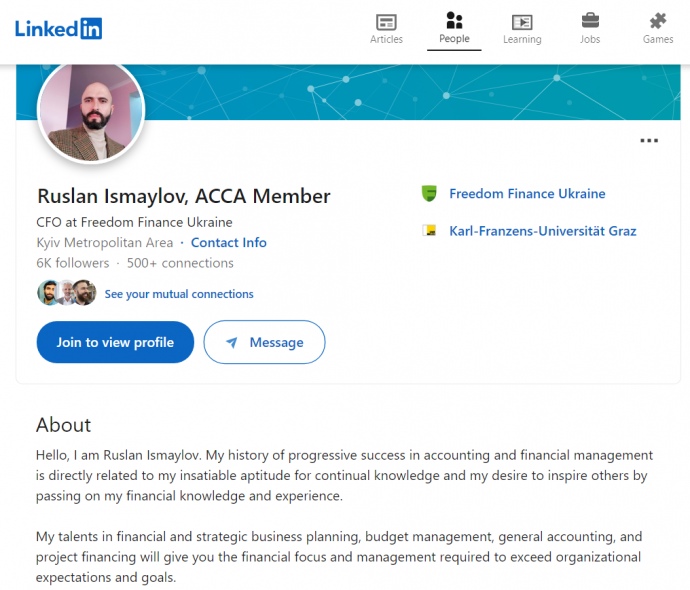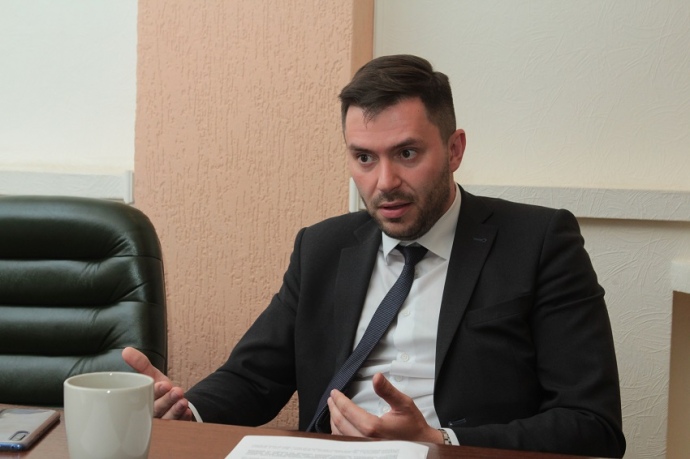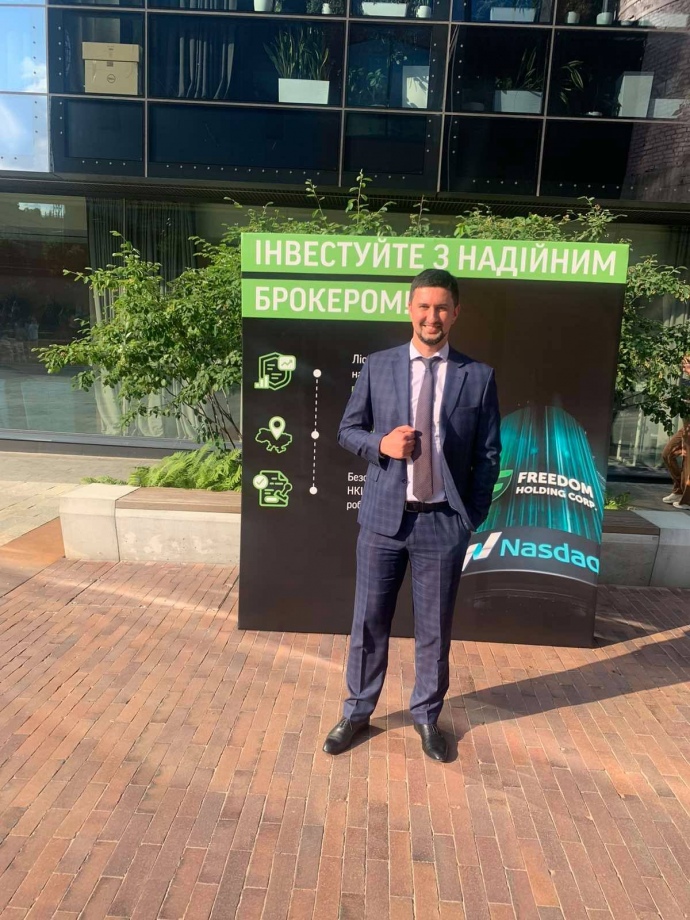Два года назад Украина ввела санкции против российского бизнесмена с казахским паспортом Тимура Турлова и его брокерской компании «Фридом финанс Украина». Ограничения СНБО оставили тысячи клиентов компании в подвешенном состоянии: все их активы заблокированы.
Ситуация осложняется тем, что тысячи украинцев покупали через «Фридом финанс» военные облигации внутреннего государственного займа (ОВГЗ) и еврооблигации, которые накануне реструктуризировало правительство.
Год назад ЭП писала о бизнесе Турлова, санкциях против его украинской компании и миллиардах гривен, к которым потеряли доступ тысячи клиентов «Фридом финанс». За это время регулятор — Нацкомиссия по ценным бумагам и фондовому рынку (НКЦБФР) — не только не смог вернуть инвесторам вложенные средства, но и не разглядел, как бизнес подсанкционного лица продолжил зарабатывать миллионы гривен на украинцах во время большой войны.
Статья 2 закона «О государственном регулировании рынков капитала» возлагает на НКЦБФР обязательства защищать права и интересы инвесторов. Эта история о том, как комиссия пренебрегает своими обязанностями в пользу интересов подсанкционного россиянина.
Санкции, которые работают только против украинцев
19 октября 2022 года Совет национальной безопасности и обороны (СНБО) ввел санкции против ряда лиц, связанных с российской агрессией. Кроме приближенных к Кремлю олигархов, под немилость украинской власти попали Турлов и «Фридом финанс Украина».
Санкции заблокировали деятельность компании, счета в которой открыли 12,7 тыс. украинцев. Общая стоимость активов этих граждан тогда составляла около 3,5 млрд грн, из которых 250 млн грн — вложения в облигации внутреннего государственного займа (ОВГЗ).
Украинское законодательство однозначно закрывает подсанкционным лицам доступ к отечественному рынку ценных бумаг (ЦБ). Следовательно, логическим воплощением санкций должна была бы стать потеря «Фридом финанс» лицензий и ликвидация компании с возвратом клиентам средств из имеющихся активов. Однако в НКЦБФР закон прочитали по-своему и вместо аннулирования лицензий решили их приостановить на время действия ограничений, то есть на пять лет.
С тех пор клиенты «Фридом Финанс Украина» оказались в подвешенном состоянии. Из-за санкций СНБО и приостановления действия лицензий они не могут ни вывести средства со счетов, ни получить проценты от государства за приобретенные ОВГЗ, ни получить деньги за их погашение, ни закрыть счета, ни перевести ценные бумаги на счета в других депозитарных учреждениях.
Номинально клиенты видят активы на своих счетах в мобильном приложении брокера, однако доступа к средствам не имеют. В таком состоянии эти инвесторы живут уже два года.
Между тем бизнес подсанкционного Турлова продолжает успешно работать в Украине. Дело в том, что «Фридом финанс Украина» — лишь одна из компаний международной группы Freedom Holding Corp. Кроме Украины, холдинг работает в Казахстане, на Кипре, в США и других юрисдикциях.
Украинским клиентам «Фридом финанс» мог открыть счета в ценных бумагах и в Украине, и на Кипре в Freedom Finance Europe. Последняя не попала ни под ограничения СНБО, ни в санкционные списки ни одной другой страны. Те, кто открыли счета в этой кипрской «дочке», свободно распоряжаются своими активами.
«Фридом» не только обслуживает счета украинцев на Кипре, но и, несмотря на санкции СНБО, продолжает работать в Украине и активно привлекает новых клиентов. Чтобы убедиться в этом, журналист ЭП посетил отделение «Фридом Финанс Украина», расположенное на улице Гончара в Киеве. Вместо закрытых дверей компании, которая не должна работать, его встретили сотрудники ООО «Учебный центр „Биржевой университет“ (НЦБУ).
Эта компания предоставляет образовательные услуги и обещает за две недели и 5-11 тыс. грн научить основам торговли ценными бумагами. По данным YouControl, ею руководит финансовый директор «Фридом финанс Украины» Руслан Исмайлов. Владелицей компании является Анастасия Острецкая, руководитель отдела маркетинга «Фридом Финанс Украины». Сам университет до декабря 2022 года назывался «Учебный центр фридом финанс».

Работники НЦБУ сообщили журналисту, что программа обучения предусматривает открытие клиентам счетов в ценных бумагах в кипрской Freedom Finance Europe. Более того, через университет можно открыть счет в компании даже без необходимости прохождения учебного курса. Его менеджеры сотрудничают с «Фридом Финанс» и при необходимости передают им контакты новых потенциальных клиентов.

Таким образом, даже после введения санкций «Фридом финанс» Турлова продолжает работать в Украине, привлекает клиентов и зарабатывает на операциях, как и до решения СНБО. Единственное неудобство — заблокированы счета клиентов, открытые во «Фридом финанс Украина», в частности приобретенные ими военные облигации Минфина и другие правительственные ЦБ.
В разговоре с ЭП члены НКЦБФР Юрий Бойко и Ярослав Шляхов сообщили, что комиссия не может влиять на Freedom Finance Europe и запрещать ее, ведь это учреждение зарегистрировано на Кипре. По словам чиновников, им ничего не известно о деятельности НЦБУ и его связи с подсанкционной компанией «Фридом финанс Украина».
ЭП также обратилась в «Фридом финанс Украины», куда НКЦБФР 11 июня 2024 года назначила временного руководителя. Там ответили, что не имеют отношения к НЦБУ, хотя учреждение работает в отделении «Фридом финанс Украины», его руководителями являются менеджеры этого же брокера, а его работники предлагают открыть счета в «Фридом финанс».
НЦБУ — не единственный след Турлова в финансовой системе Украины. Год назад ЭП писала, что ему может неформально принадлежать еще и «Скай банк». В конце концов, именно в здании этого учреждения располагается единственное киевское отделение «Фридом Финанса Украины», а ныне — НЦБУ.
Турлов несколько раз подавал документы в Национальный банк для получения разрешения на покупку этого учреждения, однако банковский регулятор такую операцию не согласовывал. Также россиянин через подконтрольную ему Freedom Finance Europe предоставил «Скай банку» 2 млн долл. и 37 млн грн в виде субординированного долга.
По данным НБУ, конечным бенефициарным владельцем «Скай банка» является гражданин Казахстана Ариф Бабаев. Год назад в регуляторе сообщили, что не считают Турлова реальным владельцем банка. С тех пор его формальные владельцы в отчетности Нацбанка не изменились

Собеседники ЭП на фондовом и банковском рынках утверждают, что «Скай банк» не просто контролируется Турловым, но и интегрирован в его брокерский бизнес в Украине. В частности, именно в этом банке хранятся денежные остатки счетов клиентов «Фридом Финанс Украина»: часть средств от погашения ОВГЗ, а также процентные доходы и погашения иностранных и корпоративных облигаций.
Это может означать, что пока действуют санкции СНБО и клиенты не могут снять со своих счетов активы и средства, банк может использовать эту ликвидность для заработков на вложениях в депозитные сертификаты НБУ. Тем более, что это не новая схема для Украины во время войны.
Собеседники ЭП, знакомые со структурой активов «Фридом Финанс Украина», говорят, что на счетах «Скай банка» есть 200-250 млн грн клиентов подсанкционного брокера. Для банка, суммарные активы которого 1 августа составляли 3,26 млрд грн, это существенный финансовый ресурс. По данным НБУ, в 2023 году «Скай банк» заработал 217,9 млн грн процентных доходов (чистая прибыль после налогообложения — 43,8 млн грн).
Лоббирование на самом высоком уровне
В марте 2022 года СБУ открыла уголовное производство по статье о финансировании действий, совершенных с целью насильственного изменения или свержения конституционного строя. В деле фигурировали «Фридом финанс Украина» и «Скай банк». СБУ подозревала брокера в финансировании терроризма, концентрации ОВГЗ в руках российских инвесторов и заведении российского капитала в Украину. Самая интересная деталь дела — вероятная связь «Фридом Финанс» с некоторыми украинскими чиновниками.
«Установлено, что в указанный выше период (2019-2022 годы) интересы ООО «Фридом финанс Украина» на фондовом рынке Украины лоббировали должностные лица НКЦБФР, которые способствовали решению любых вопросов по сохранению лицензий указанного общества, несмотря на нарушение последними требований лицензионной деятельности на рынках капитала Украины», — говорится в постановлении Шевченковского суда Киева.
До недавнего времени НКЦБФР «способствовала решению любых вопросов по сохранению лицензии» еще одного бизнеса россиянина — «Украинской биржи». Турлов — единственное лицо, имеющее существенное участие в капитале биржи. Ему через подконтрольную Freedom Holding Corp. принадлежат 24,26% акций «Украинской биржи».
НКЦБФР полтора года не замечала, что совладельцем одной из трех крупнейших фондовых бирж в стране был подсанкционный российский бизнесмен. Лишь после огласки этой ситуации в марте 2024 года комиссия «заметила» след Турлова и Минфина РФ в фондовой бирже и через три месяца отозвала лицензию.
После введения СНБО санкций против «Фридом Финанса Украины» комиссия три недели думала над их воплощением в жизнь. В конце концов, вместо аннулирования лицензии и начала процесса ликвидации брокера решила приостановить действие лицензии на пять лет (столько же действуют санкции). Такие действия НКЦБФР лишь подтверждают подозрения СБУ, что чиновники регулятора могут лоббировать интересы бизнеса Турлова. Кто именно этим занимается?
Несколько собеседников ЭП на фондовом рынке и в банковской сфере утверждают, что с Турловым знаком председатель НКЦБФР Руслан Магомедов. В частности, еще до назначения в комиссию последний якобы помогал «Фридому финансу» выходить на украинский рынок. Более того, Магомедов в 2019 году пытался помочь Турлову получить согласование от НБУ на покупку «Скай банка». Очевидно, эти попытки оказались напрасными.

Глава НКЦБФР на звонки ЭП не ответил. Как и на пересмотренные им вопросы о его потенциальной связи с Турловым и вероятной помощи последнему в получении согласования от НБУ на покупку «Скай банка».
Собеседники издания в НКЦБФР утверждают, что после применения санкций против «Фридом Финанс» руководство комиссии добивалось их пересмотра или отмены. Этой же позиции члены комиссии придерживались в разговоре с журналистом ЭП в сентябре 2023 года.
Когда это не удалось, неофициальной стратегией комиссии в отношении заблокированных активов клиентов украинского «Фридома» стало ожидание момента, когда истечет срок санкций. Хотя эта стратегия работает, однако бездействие НКЦБФР едва не нанесло некоторым клиентам подсанкционного брокера убытки на миллионы гривен.
От бездействия к убыткам
В июле 2024 года Минфин договорился с держателями еврооблигаций об условиях реструктуризации внешнего госдолга. Инвесторы согласились списать часть долга Украины. Для этого старые еврооблигации обменяли на бумаги нового выпуска.
Реструктуризация происходила в несколько этапов. На первом, который длился до 23 августа, инвесторы могли прислать свое согласие на условия реструктуризации и получить за это вознаграждение — 1,25% от номинальной стоимости своих ценных бумаг. На втором этапе старые евробонды обменивали на новые бесплатно.
Владельцы еврооблигаций есть и среди клиентов «Фридом Финанс Украина». После введения санкций против брокера они потеряли доступ к этим активам и любые права распоряжаться ими. В частности, они не могли направить Минфину свое согласие на условия реструктуризации и получить дополнительные 1,25%.
Руководитель инициативной группы пострадавших частных клиентов «Фридом Финанс Украина» Максим Дыбенко заявил ЭП, что украинские евробонды исчезли со счетов клиентов брокера, а новые бумаги по итогам реструктуризации не начислили.
Нацбанк пояснил, что он обменял старые еврооблигации на временные ISIN-коды, однако, вероятно, внутренние системы «Фридом Финанс» не отразили эти зачисления в личных кабинетах клиентов. По данным НБУ, если клиенты фирмы не согласятся обменять свои еврооблигации в рамках реструктуризации, то государство изымет эти бумаги и обменяет их на новые, которые продаст на рынке, а полученные средства зачислит на счета этих клиентов.
Поскольку предоставление согласия на реструктуризацию оставалось под запретом из-за санкций СНБО, то клиенты «Фридом Финанс» рисковали потерять не только комиссию за согласие, но и часть номинала новых евробондов. Дело в том, что, скорее всего, их продажа происходила бы по рыночной цене. Сейчас, по данным Bloomberg, эти бумаги торгуются за 16-18% от номинала, то есть клиенты «Фридома» могли потерять более 80% от стоимости своих инвестиций во внешний долг Украины.
Уберечь их от потенциальных потерь могло решение НКЦБФР разрешить им согласиться с условиями реструктуризации. До 23 августа, когда клиенты еще могли получить комиссию за согласие, НКЦБФР не приняла это решение. Лишь после публичной критики и обвинений в бездействии комиссия 1 октября позволила клиентам фирмы получить новые евробонды.
По данным Дыбенко, клиенты «Фридом Финанс Украина» держали на счетах еврооблигации общей стоимостью около 800 млн грн. Следовательно, запоздалая выдача разрешения могла стоить им 10 млн грн. Показательно, что инвесторы, евробонды которых хранились в кипрской Freedom Finance Europe, никаких проблем в ходе реструктуризации украинского госдолга не имели. Пострадали лишь клиенты брокера, деятельность которого регулирует НКЦБФР.
Дыбенко не исключает, что клиенты «Фридом Финанс Украина» обратятся в суд для возмещения убытков, причиненных бездействием НКЦБФР. Речь идет не только об утраченной возможности получить комиссию, но и о потерях, связанных с тем, что их активы в течение двух лет остаются замороженными.
Свет в конце тоннеля
Бойко и Шляхов отказались предоставлять какие-либо предметные ответы на вопросы журналиста ЭП, которые касались деятельности «Фридом Финанс Украина» и перспектив разблокирования счетов ее клиентов. Члены комиссии не смогли объяснить, почему так поздно приняли решение о предоставлении разрешения клиентам компании получить новые еврооблигации в рамках реструктуризации государственного долга.
«Наш принцип — «не словом, а делом». Мы не тот орган, который хвастается обещаниями. Мы делаем все по факту. Мы не политический орган, мы — независимый регулятор, мы не играем в политику», — отметил Бойко.
Оба члена комиссии просили ЭП не публиковать статью о «Фридом финанс Украина», ведь, по их словам, против регулятора осуществляется «информационная акция». Также они заявили, что в течение следующих нескольких недель действия НКЦБФР в отношении клиентов подсанкционного брокера станут понятными, как и будущее его клиентов.
Члены комиссии намекнули, что возможная разблокировка активов клиентов «Фридом Финанс Украина» лежит не только в поле полномочий НКЦБФР, но и во многом зависит от государственной санкционной политики. Уполномоченный президента Украины по вопросам санкций Владислав Власюк сообщил ЭП, что пересмотра ограничений ни в отношении «Фридом Финанс Украина», ни в отношении Турлова в ближайшее время не будет.
Как стало известно ЭП, значительная часть активов, заблокированных на счетах «Фридом Финанс», может принадлежать лицам, связанным с Турловым. Кроме того, до введения санкций компания выпускала различные синтетические продукты на базе государственных облигаций Украины. Например, предлагала клиентам продукт, который позволял получать купонные платежи по ОВГЗ не раз в полгода, а ежемесячно. Формально такие облигации находились на балансе «Фридом Финанс Украины», а не ее клиентов.
Сейчас задача НКЦБФР и назначенного ею временного руководителя «Фридома» — аудит активов брокера и открытых в нем счетов. По данным источников ЭП в правоохранительных органах, к этому аудиту комиссия хочет привлечь СБУ. Вероятно — чтобы затянуть время.
Клиенты украинского «Фридом Финанса» опасаются, что за закрытыми дверями НКЦБФР может происходить «очередная попытка сохранения бизнес-интересов Турлова». Они сообщили ЭП, что их счета якобы могут перевести в новосозданную компанию «Варто брокер». По данным YouControl, ее учредителями являются работники «Фридом Финанс Украина» Виталий Братошек и Татьяна Новикова, а зарегистрирована она в киевском Unit city, недвижимостью в котором владеет «Фридом».

Источники издания в НКЦБФР подтвердили, что фирма «Варто брокер» на днях подала документы на получение лицензий, необходимых для деятельности на фондовом рынке, однако выразили сомнение, что именно эту компанию могут использовать для разблокирования активов «Фридом Финанс Украина».
Пока 12 тыс. украинцев ждут, когда НКЦБФР «не словом, а делом» докажет свою способность регулировать фондовый рынок, из самой комиссии массово увольняется персонал. Магомедов и Шляхов проводят реорганизацию, в рамках которой ее сотрудникам предложили подписать трехмесячные контракты без перспектив продления. Работники теряют льготы, которые предоставляет госслужба, а некоторые — бронирование от мобилизации.
Из-за массовых увольнений руководство НКЦБФР подготовило письмо премьер-министру Денису Шмыгалю с просьбой рассмотреть возможность введения органа в простой, говорят собеседники ЭП в комиссии и Верховной Раде. Предполагается, что в пределах простоя Нацкомиссия не будет работать, однако ее работники, в частности руководство, будут продолжать получать две трети заработной платы.
Как должен работать рынок без регулятора — неизвестно. Однако, учитывая, как регулятор показал свою «эффективность» на примере «Фридом финанс», есть высокая вероятность, что его отсутствие рынок не почувствует.


